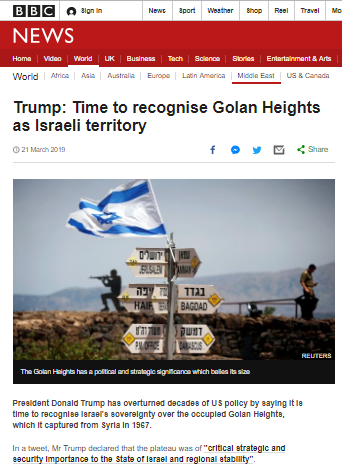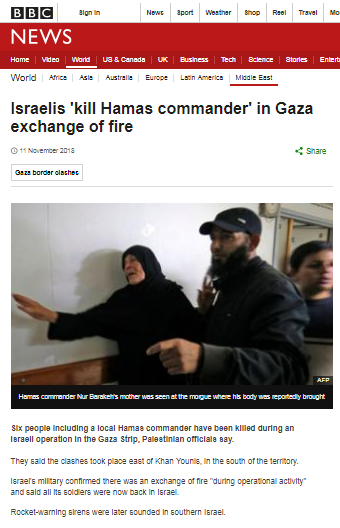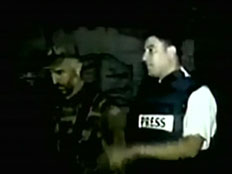On January 20th the BBC ran a special cross-platform project titled ‘Democracy Day’ to mark the 750th anniversary of the establishment of the first parliament of elected representatives at Westminster. The contribution to that project appearing on the BBC News website’s Middle East page came in the form of an article by Yolande Knell which was promoted under the heading “Democracy in doldrums” and carried the sub-heading “What’s to blame for Palestinians’ failure to hold fresh polls?”.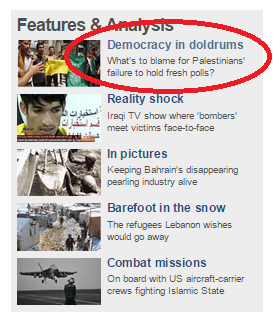
The answers supplied to that question in Knell’s article – titled “How Palestinian democracy has failed to flourish” – were as predictable as both the topics she chose to avoid and the messaging unrelated to the article’s subject matter which she elected to promote.
The two descriptions of Hamas in Knell’s article are as follows:
“In 2005, after the Palestinian Islamist militant group, Hamas, participated in elections for the first time, it took over several local councils, including Qalqilya.”
And:
“In 2006 Israel banned Hamas, which it regards as a terrorist organisation, from campaigning in East Jerusalem and blocked its inclusion on ballot papers in the sector.” [all emphasis added]
Of course Israel is far from the only country to classify Hamas as a proscribed terrorist organization; so do the United States, the European Union, Canada and Japan. In addition, Jordan and Egypt have banned Hamas and Australia designates Hamas’ Izz al Din Al Qassam Brigades as a terrorist organization, as do New Zealand and the United Kingdom. Had readers been informed of those facts, they would have been in a better position to understand the background to the following part of Knell’s article:
“…Hamas went on to win a decisive victory in the Palestinian legislative elections in January 2006 – winning 74 of the 132 seats.
Turnout was high at 78% and international monitors said the vote was largely free and fair.
But the result was met with dismay by Israel and Western donors – which prop up the Palestinian Authority (PA).
They refused to deal with Hamas politically unless the group renounced violence and its commitment to the destruction of Israel. Funds to pay for vital services were stopped or diverted.”
Indeed, the international community in the form of the Quartet (composed of the UN, the US, the EU and Russia) refused to deal with a government run by a terrorist organisation which, in addition to refusing to renounce violence and recognize Israel as its predecessor had done, also refused to honour the existing agreements signed between the Palestinian National Authority and Israel (and witnessed and guaranteed by some Quartet members) which had created the former institution.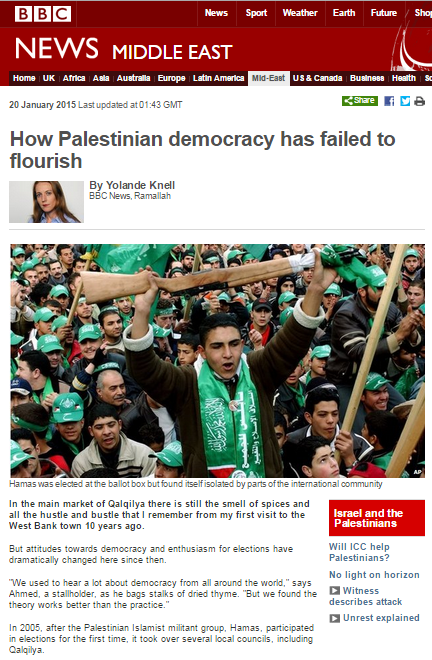
However, the simplistic take-away messaging which Yolande Knell chose to promote to BBC audiences is as follows:
“We’re only allowed democracy if the West likes our choices,” comments one Qalqilya shopper as he reflects on this troubled political history. “They supported us when we went to the ballot boxes but did a u-turn when Islamists won.”
The issue of the refusal of Hamas and other groups to renounce terror as an obstacle to democracy does not come under discussion in Knell’s report and neither does the fact that Hamas cannot be accurately described as a democratic body in itself. Its violent military coup against the Palestinian Authority in the Gaza Strip is described by Knell in the following euphemistic terms:
“While a new unity government was briefly set up a year later, it was soon dismissed amid bitter infighting between Fatah and Hamas.
This led to the political bifurcation of the West Bank – where Fatah reasserted its authority – and the Gaza Strip – where Hamas ran a rival administration.”
Her so-called discussion of Palestinian democracy also fails to make any mention of the Hamas practice of carrying out extra-judicial executions and its institutional persecution of religious minorities, women, gays and political rivals.
Knell bases her article around the town of Qalqilya and that provides the opportunity for some of her inevitable politically motivated messaging, despite the fact that it is irrelevant to the supposed topic of her report.
“The mayor points to a large map on the wall that shows Qalqilya virtually encircled by concrete sections of the separation barrier that Israel has built in and around the West Bank. The barrier is made up mainly of chain-link fence topped with barbed wire, but in some areas consists of 8m- (25ft-) high walls.
Israel says the barrier is needed to protect it from Palestinian attackers but it also restricts the movements of ordinary Palestinians and cuts them off from profitable agricultural land.”
No effort is made to provide audiences with the all-important context of the terrorist infrastructure in that town which made it the source of many terror attacks during the second Intifada, including the Dolphinarium attack. In line with the usual BBC practice, Knell fails to inform readers of the proven effectiveness of the anti-terrorist fence and employs the standard ‘Israel says’ nod to impartiality.
Knell also fails to inform her readers that Qalqilya is in Area A and that, like the vast majority of the Palestinians, its residents have lived under the control of the Palestinian Authority for two decades. Of course had she included that vital context, her article’s money quote would have been considerably less effective because readers would have realized that most of the Palestinians do not live “under Israeli occupation” at all.
“We’re a democratic society. It’s in our blood,” Mr Dawood says. “We have long had different political factions and ideologies. There are public consultations. But in the end we cannot have a real democracy under Israeli occupation.” [emphasis added]
Knell makes no effort to point out to readers that issues such as freedom of the press, freedom of association and rights for women and minorities are entirely under the control of the Palestinian Authority. She also fails to clarify the important point that Palestinian basic law stipulates that “the principles of Islamic Shari’a shall be the main source of legislation” – a fact which obviously has considerable influence on the degree of democracy in Palestinian society.
With regard to the issue of the absence of presidential and PLC elections, Knell writes:
“Although a new unity deal was struck between Hamas and Fatah last April, so far their technocratic government has failed to pave the way for promised elections across Gaza, the West Bank and East Jerusalem, the latter annexed by Israel in a move not recognised internationally.”
Her tepid portrayal fails to adequately clarify that the Hamas-Fatah reconciliation agreement stipulated that elections would be held six months after its implementation – i.e. in January 2015 – and she makes no attempt to discuss the political background to the Palestinian unity government’s failure to call elections or to enhance readers’ understanding of why the Fatah-dominated PA might not be too keen to gamble on the current status quo.
With the BBC generally avoiding any meaningful coverage of internal Palestinian affairs, this article could have gone some way towards rectifying that had Yolande Knell been more interested in her mission to inform BBC audiences on international issues than in promoting her standard political messaging.
As it is, BBC audiences remain little the wiser as to why Palestinian democracy is in “the doldrums” or what is the state of affairs regarding basic tenets of democracy such as human rights, freedom of the press and the rule of law in the areas under PA or Hamas control. Instead, readers once again herded towards a view of passive Palestinians lacking agency to change anything in their society because whatever ills there are – it’s always Israel’s fault.
Related Articles:


